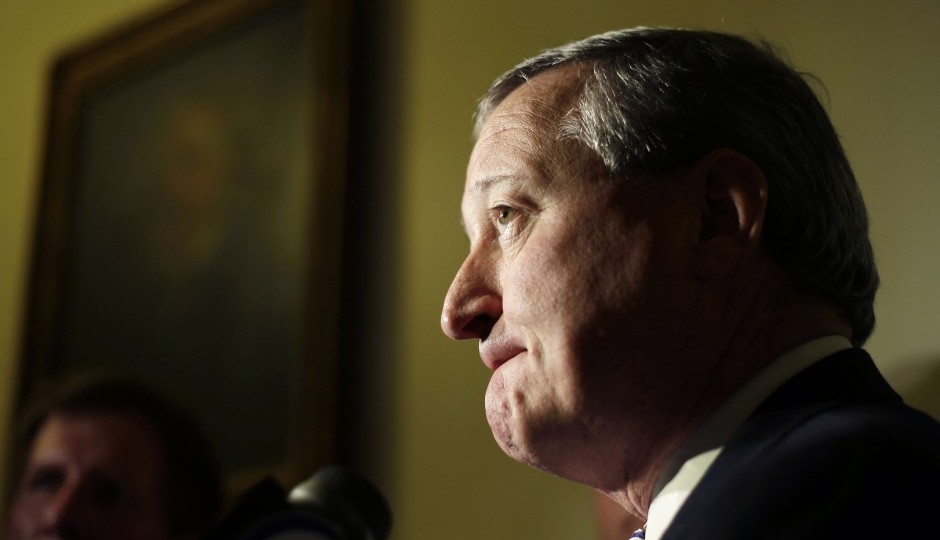The Brief: Can Jim Kenney Unite Old & New Philadelphia?
 One of the many intriguing questions raised by Liz Spikol’s terrific new profile of mayoral candidate Jim Kenney is this: Can Philadelphia’s labor movement and Center City progressives unite?
One of the many intriguing questions raised by Liz Spikol’s terrific new profile of mayoral candidate Jim Kenney is this: Can Philadelphia’s labor movement and Center City progressives unite?
Let’s start by discussing what we mean, exactly, by the term “Center City progressives.” This cohort—which actually includes significant populations in West and Northwest Philly as well—isn’t entirely synonymous old school liberals. Yes, they’re reliably Democratic. They voted, enthusiastically, for Barack Obama (twice), and few among them would ever consider voting for a Republican presidential or gubernatorial candidate. But many in this cohort are also, at the local level, a little uncomfortable with unions and the political power they wield in Philadelphia [particularly a) the public employee unions, because of questions about pensions and compensation and taxes, and b) the building trades unions, because of their overt political maneuvering and outsized influence].
Think of it this way: on the Center City progressive side of this divide are figures like Michael Nutter and Paul Levy. On the union side, you’ve got figures like Bob Brady and John Dougherty (note that the figures on both sides don’t need to best buds to be batting for, essentially, the same team). The distinctions are about culture and class as much as they’re about policy. Which is part of why it has seemed so unlikely that labor voters and Center City progressives could ever rally around the same candidate.
And then Jim Kenney entered the race. Like few if any mayoral candidates before him, Kenney has the potential to appeal just as much to the G-Ho design consultant who bikes to work as he does the South Philly lifer who got his boilermakers union card at 19. It’s a (potentially) powerful political combination.
As Spikol explains:
Jim Kenney came up old-school Philly — Irish Catholic, a Mummer, a firefighter’s son. A lot of his friends from the old days left town, moved to suburbs like Havertown and schools like Archbishop Carroll. They moved, but they didn’t really change.
Kenney — he stayed. And as Philadelphia changed, as it evolved, Kenney evolved, too. He got into politics; he became a popular Penn professor, and a tireless fighter for lesbian, gay, bisexual and transgender equality, and an early advocate for immigrant rights. He’s the sponsor of Philadelphia’s marijuana decriminalization bill, and the kind of guy who’s greeted as a conquering hero by young progressive Democrats at a hipster bar. “Jim would always tell people that he’s lived in two houses his whole life — both within one South Philly zip code,” one City Hall observer told me. “Now he lives in Old City and shops at Kenneth Cole and hangs out at La Colombe.”
Kenney has found a potent political identity in that liminal space between old Philly and new. Nobody on the political stage today better blends the characters of those two great, colliding halves of the city. At his best, Kenney is like a walking hybrid of Two Street and a pop-up beer garden. It’s a combination that makes him a formidable candidate, with the potential to appeal to a broad swath of voters…
The early evidence suggests that Kenney is, in fact, pulling this off. He’s winning union endorsements left and right. And from what I’ve seen, progressive enthusiasm over Kenney hasn’t waned at all.
And yet, for all that, I wonder how durable this coalition will prove to be. How will the Center City half of Kenney’s base react to potential independent attack ads that highlight his coziness with Johnny Doc, or his past affiliation with Vince Fumo? How would Kenney’s old buddies on Two Street feel about an ominous, 30-second spot highlighting Kenney’s sponsorship of weed decriminalization and (arguably) the nation’s most liberal municipal gay-rights legislation?
I expect we’ll find out before this campaign is over.
Don’t Miss…
- These videos of 7th district council candidate / Facebook hacking victim Manny Morales are surreal. Much credit to KYW’s Steve Tawa for his tenacious, on-point questioning. Still: can we please stop talking about him now? Great.
- Tom Ferrick has a tough, perhaps unduly uncharitable look at Nelson Diaz’s school funding plan. Stay tuned for something more from Citified on this.
- Climate change is real enough that SEPTA is changing operations to deal with it, reports Paul Nussbaum.
- Governor Tom Wolf wants the state’s retirement systems to ditch their expensive investment managers and plunk their cash in low-cost, non-actively managed funds instead.